Final Dissertation: Hong Kong Energy Management and Quality Analysis
VerifiedAdded on 2023/06/10
|65
|19204
|146
Thesis and Dissertation
AI Summary
This dissertation explores the quality of energy management in Hong Kong, examining the existing energy systems and identifying opportunities for improvement. The research investigates energy consumption patterns, including electricity, oil, and gas usage, and analyzes the role of different sectors like domestic, industrial, and commercial buildings. It reviews the evolution of energy management in Hong Kong, considering factors like government policies, the involvement of organizations such as the Business Environment Council Limited and the Electrical and Mechanical Services Department (EMSD), and the adoption of standards like ISO 50001. The methodology includes both secondary data collection from various sources and primary data collection through interviews with experts. The study aims to assess the current state of energy management, identify potential areas for quality improvement, and propose a strategic implementation plan with risk assessment and legal considerations. The research also examines the import and production of energy resources, the impact of energy consumption on the environment, and the potential for sustainable energy practices. Finally, the dissertation provides recommendations for enhancing the efficiency and sustainability of energy management in Hong Kong.
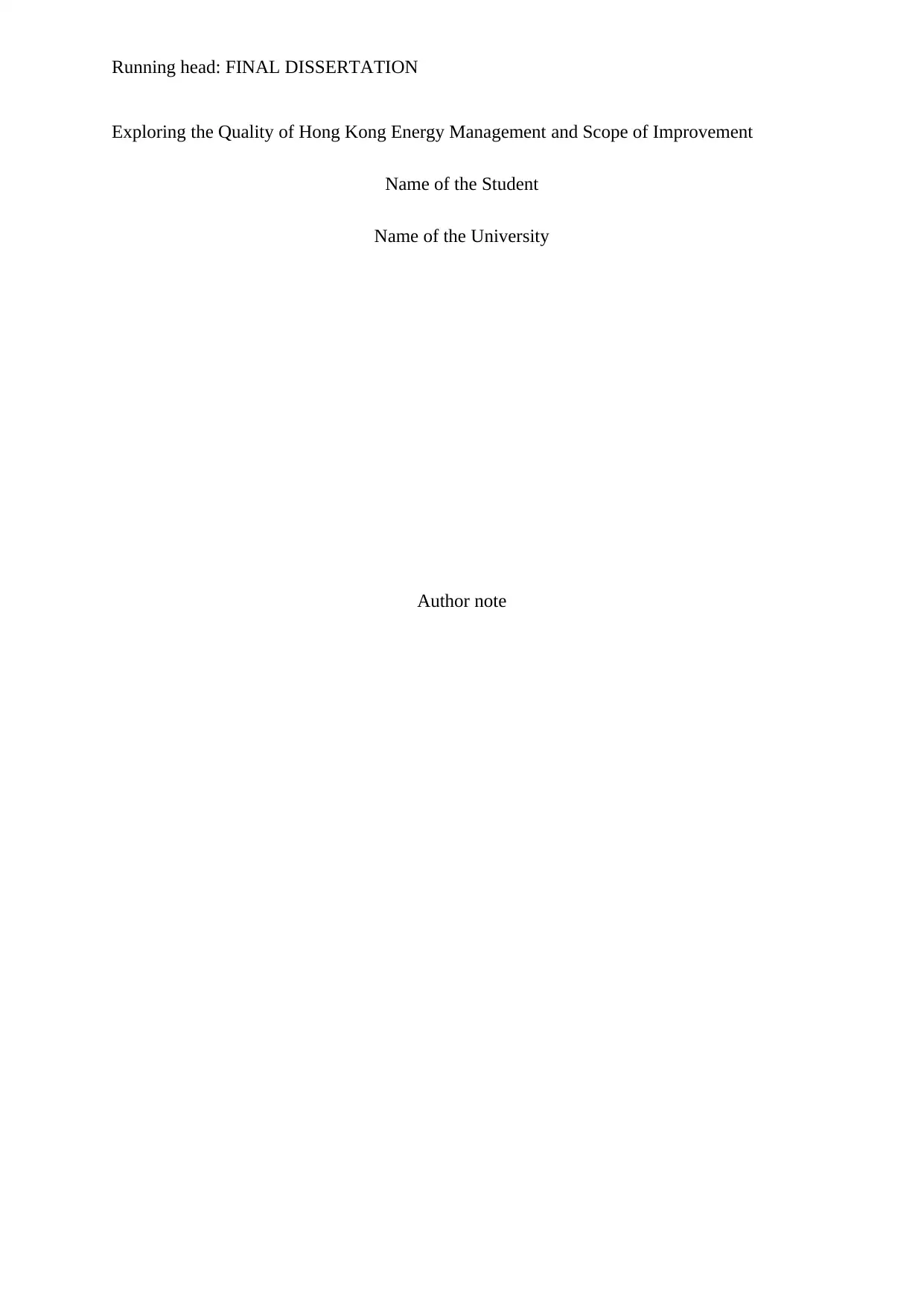
Running head: FINAL DISSERTATION
Exploring the Quality of Hong Kong Energy Management and Scope of Improvement
Name of the Student
Name of the University
Author note
Exploring the Quality of Hong Kong Energy Management and Scope of Improvement
Name of the Student
Name of the University
Author note
Paraphrase This Document
Need a fresh take? Get an instant paraphrase of this document with our AI Paraphraser
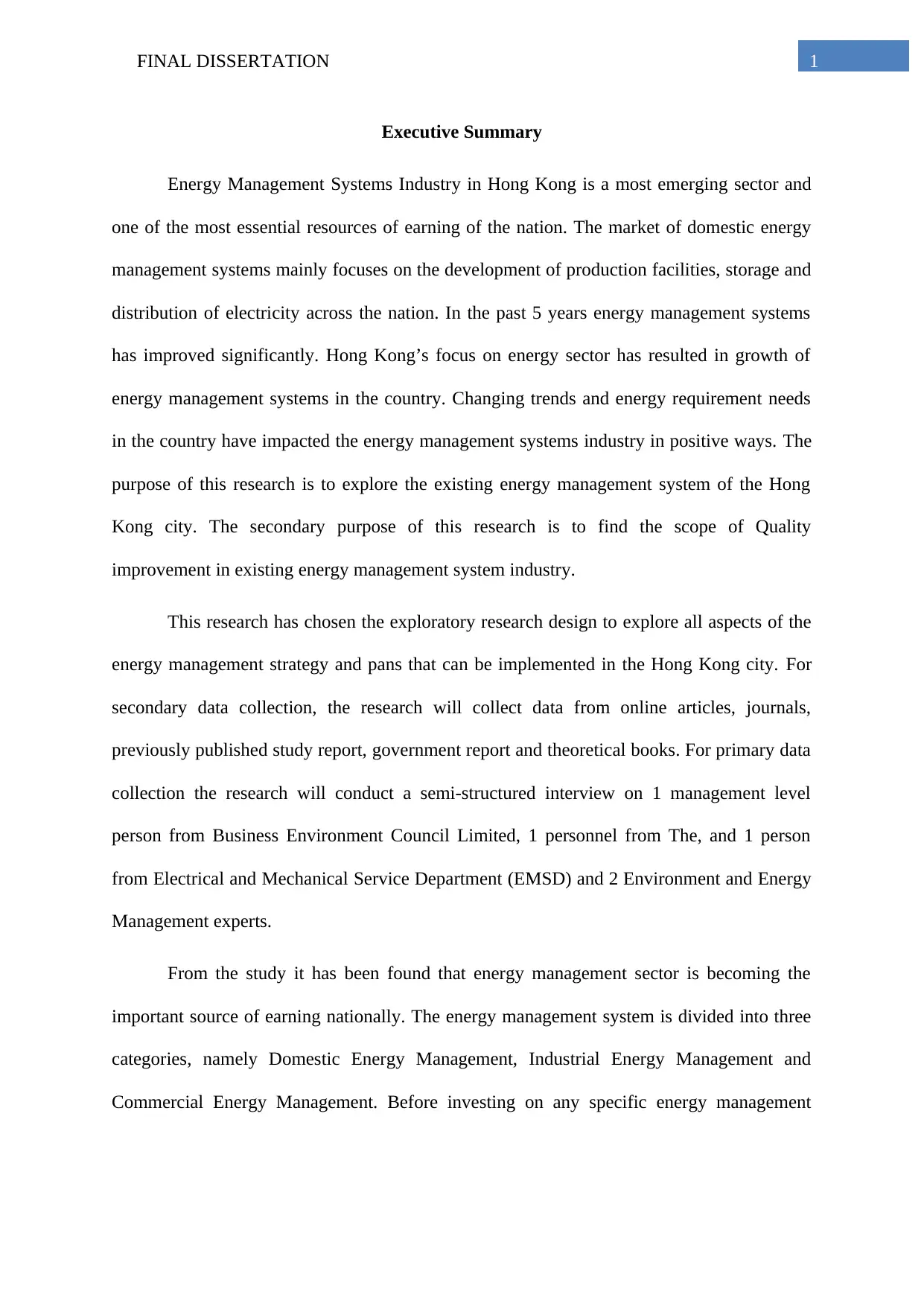
1FINAL DISSERTATION
Executive Summary
Energy Management Systems Industry in Hong Kong is a most emerging sector and
one of the most essential resources of earning of the nation. The market of domestic energy
management systems mainly focuses on the development of production facilities, storage and
distribution of electricity across the nation. In the past 5 years energy management systems
has improved significantly. Hong Kong’s focus on energy sector has resulted in growth of
energy management systems in the country. Changing trends and energy requirement needs
in the country have impacted the energy management systems industry in positive ways. The
purpose of this research is to explore the existing energy management system of the Hong
Kong city. The secondary purpose of this research is to find the scope of Quality
improvement in existing energy management system industry.
This research has chosen the exploratory research design to explore all aspects of the
energy management strategy and pans that can be implemented in the Hong Kong city. For
secondary data collection, the research will collect data from online articles, journals,
previously published study report, government report and theoretical books. For primary data
collection the research will conduct a semi-structured interview on 1 management level
person from Business Environment Council Limited, 1 personnel from The, and 1 person
from Electrical and Mechanical Service Department (EMSD) and 2 Environment and Energy
Management experts.
From the study it has been found that energy management sector is becoming the
important source of earning nationally. The energy management system is divided into three
categories, namely Domestic Energy Management, Industrial Energy Management and
Commercial Energy Management. Before investing on any specific energy management
Executive Summary
Energy Management Systems Industry in Hong Kong is a most emerging sector and
one of the most essential resources of earning of the nation. The market of domestic energy
management systems mainly focuses on the development of production facilities, storage and
distribution of electricity across the nation. In the past 5 years energy management systems
has improved significantly. Hong Kong’s focus on energy sector has resulted in growth of
energy management systems in the country. Changing trends and energy requirement needs
in the country have impacted the energy management systems industry in positive ways. The
purpose of this research is to explore the existing energy management system of the Hong
Kong city. The secondary purpose of this research is to find the scope of Quality
improvement in existing energy management system industry.
This research has chosen the exploratory research design to explore all aspects of the
energy management strategy and pans that can be implemented in the Hong Kong city. For
secondary data collection, the research will collect data from online articles, journals,
previously published study report, government report and theoretical books. For primary data
collection the research will conduct a semi-structured interview on 1 management level
person from Business Environment Council Limited, 1 personnel from The, and 1 person
from Electrical and Mechanical Service Department (EMSD) and 2 Environment and Energy
Management experts.
From the study it has been found that energy management sector is becoming the
important source of earning nationally. The energy management system is divided into three
categories, namely Domestic Energy Management, Industrial Energy Management and
Commercial Energy Management. Before investing on any specific energy management
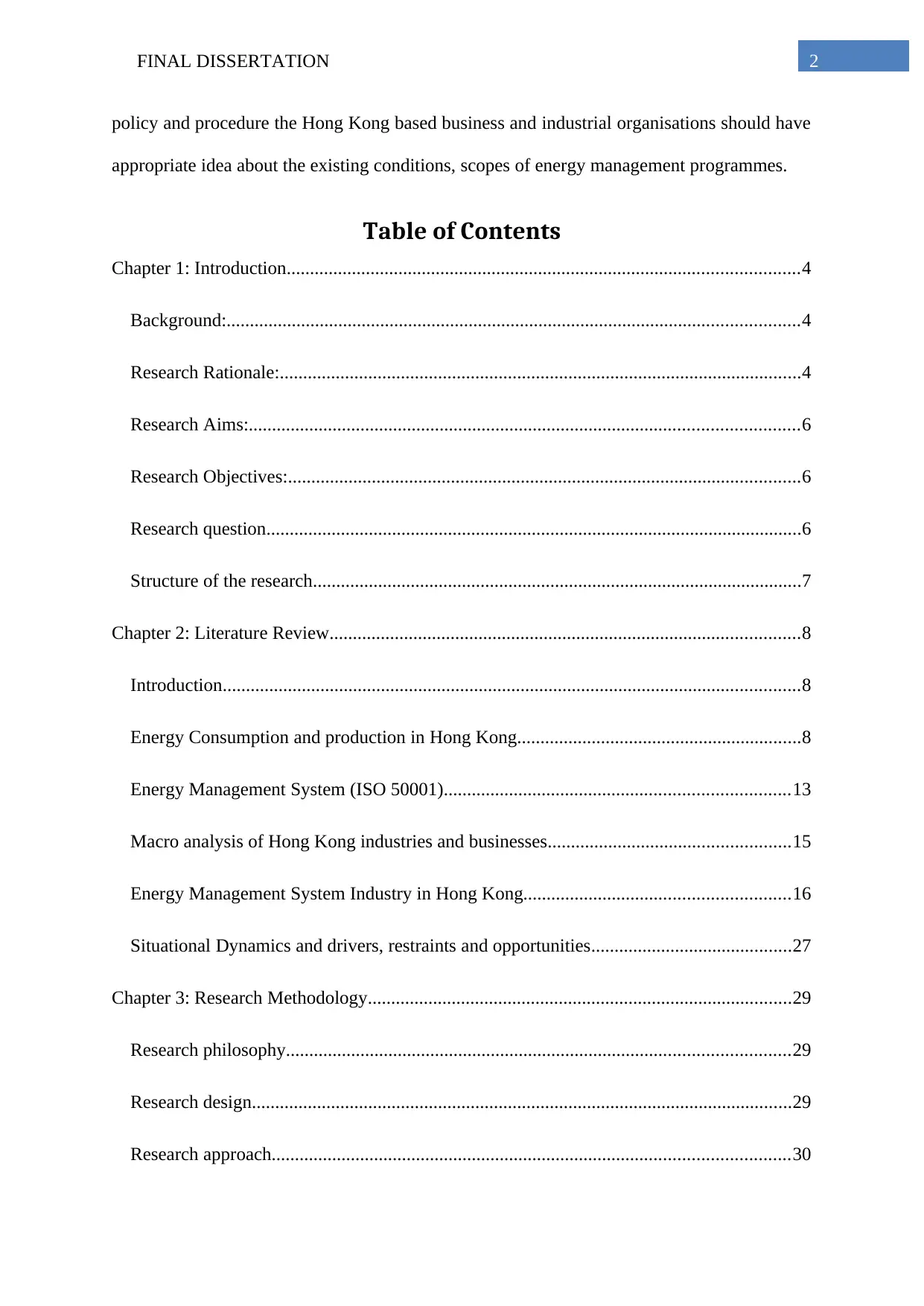
2FINAL DISSERTATION
policy and procedure the Hong Kong based business and industrial organisations should have
appropriate idea about the existing conditions, scopes of energy management programmes.
Table of Contents
Chapter 1: Introduction..............................................................................................................4
Background:...........................................................................................................................4
Research Rationale:................................................................................................................4
Research Aims:......................................................................................................................6
Research Objectives:..............................................................................................................6
Research question...................................................................................................................6
Structure of the research.........................................................................................................7
Chapter 2: Literature Review.....................................................................................................8
Introduction............................................................................................................................8
Energy Consumption and production in Hong Kong.............................................................8
Energy Management System (ISO 50001)..........................................................................13
Macro analysis of Hong Kong industries and businesses....................................................15
Energy Management System Industry in Hong Kong.........................................................16
Situational Dynamics and drivers, restraints and opportunities...........................................27
Chapter 3: Research Methodology...........................................................................................29
Research philosophy............................................................................................................29
Research design....................................................................................................................29
Research approach...............................................................................................................30
policy and procedure the Hong Kong based business and industrial organisations should have
appropriate idea about the existing conditions, scopes of energy management programmes.
Table of Contents
Chapter 1: Introduction..............................................................................................................4
Background:...........................................................................................................................4
Research Rationale:................................................................................................................4
Research Aims:......................................................................................................................6
Research Objectives:..............................................................................................................6
Research question...................................................................................................................6
Structure of the research.........................................................................................................7
Chapter 2: Literature Review.....................................................................................................8
Introduction............................................................................................................................8
Energy Consumption and production in Hong Kong.............................................................8
Energy Management System (ISO 50001)..........................................................................13
Macro analysis of Hong Kong industries and businesses....................................................15
Energy Management System Industry in Hong Kong.........................................................16
Situational Dynamics and drivers, restraints and opportunities...........................................27
Chapter 3: Research Methodology...........................................................................................29
Research philosophy............................................................................................................29
Research design....................................................................................................................29
Research approach...............................................................................................................30
⊘ This is a preview!⊘
Do you want full access?
Subscribe today to unlock all pages.

Trusted by 1+ million students worldwide
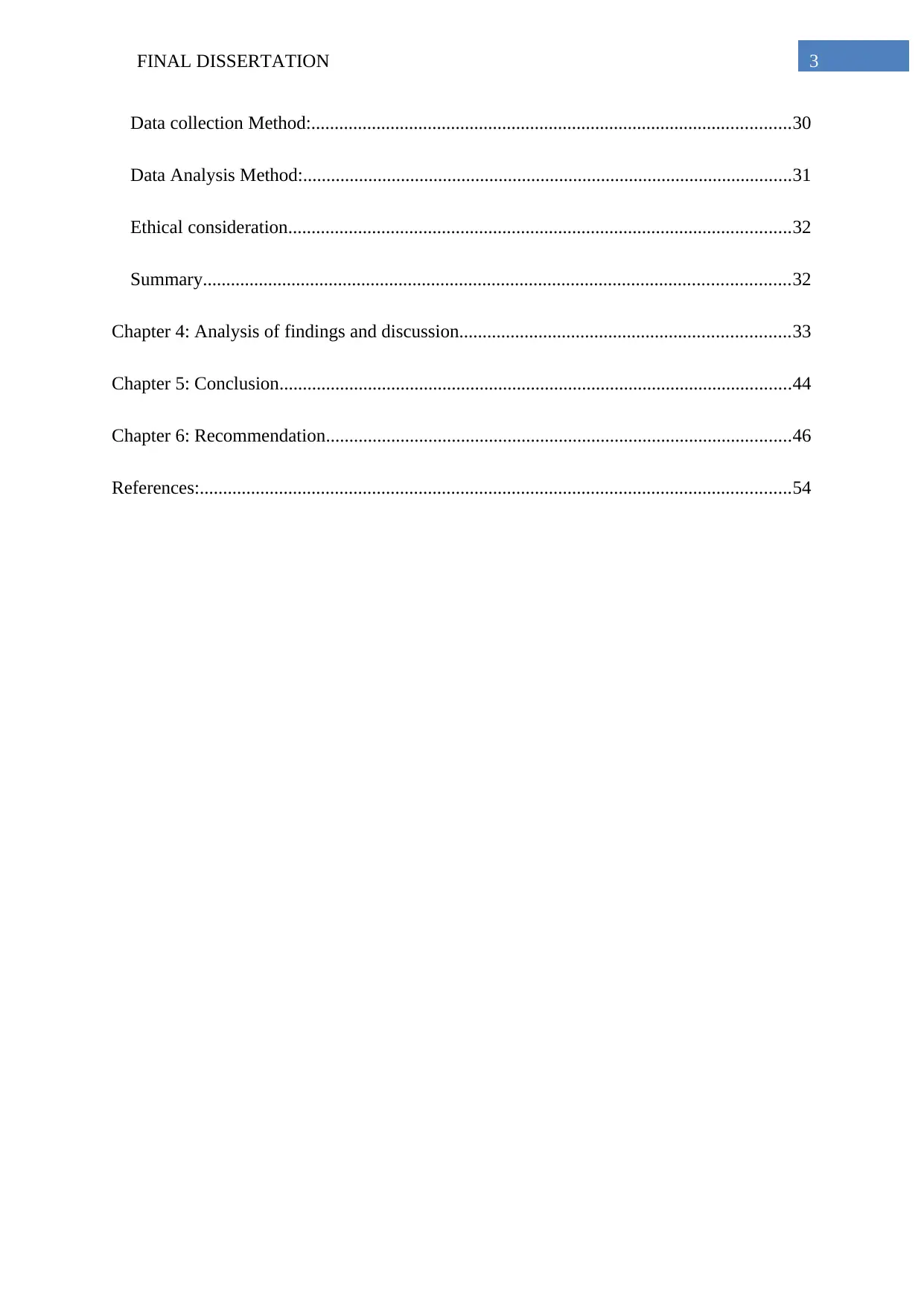
3FINAL DISSERTATION
Data collection Method:.......................................................................................................30
Data Analysis Method:.........................................................................................................31
Ethical consideration............................................................................................................32
Summary..............................................................................................................................32
Chapter 4: Analysis of findings and discussion.......................................................................33
Chapter 5: Conclusion..............................................................................................................44
Chapter 6: Recommendation....................................................................................................46
References:...............................................................................................................................54
Data collection Method:.......................................................................................................30
Data Analysis Method:.........................................................................................................31
Ethical consideration............................................................................................................32
Summary..............................................................................................................................32
Chapter 4: Analysis of findings and discussion.......................................................................33
Chapter 5: Conclusion..............................................................................................................44
Chapter 6: Recommendation....................................................................................................46
References:...............................................................................................................................54
Paraphrase This Document
Need a fresh take? Get an instant paraphrase of this document with our AI Paraphraser
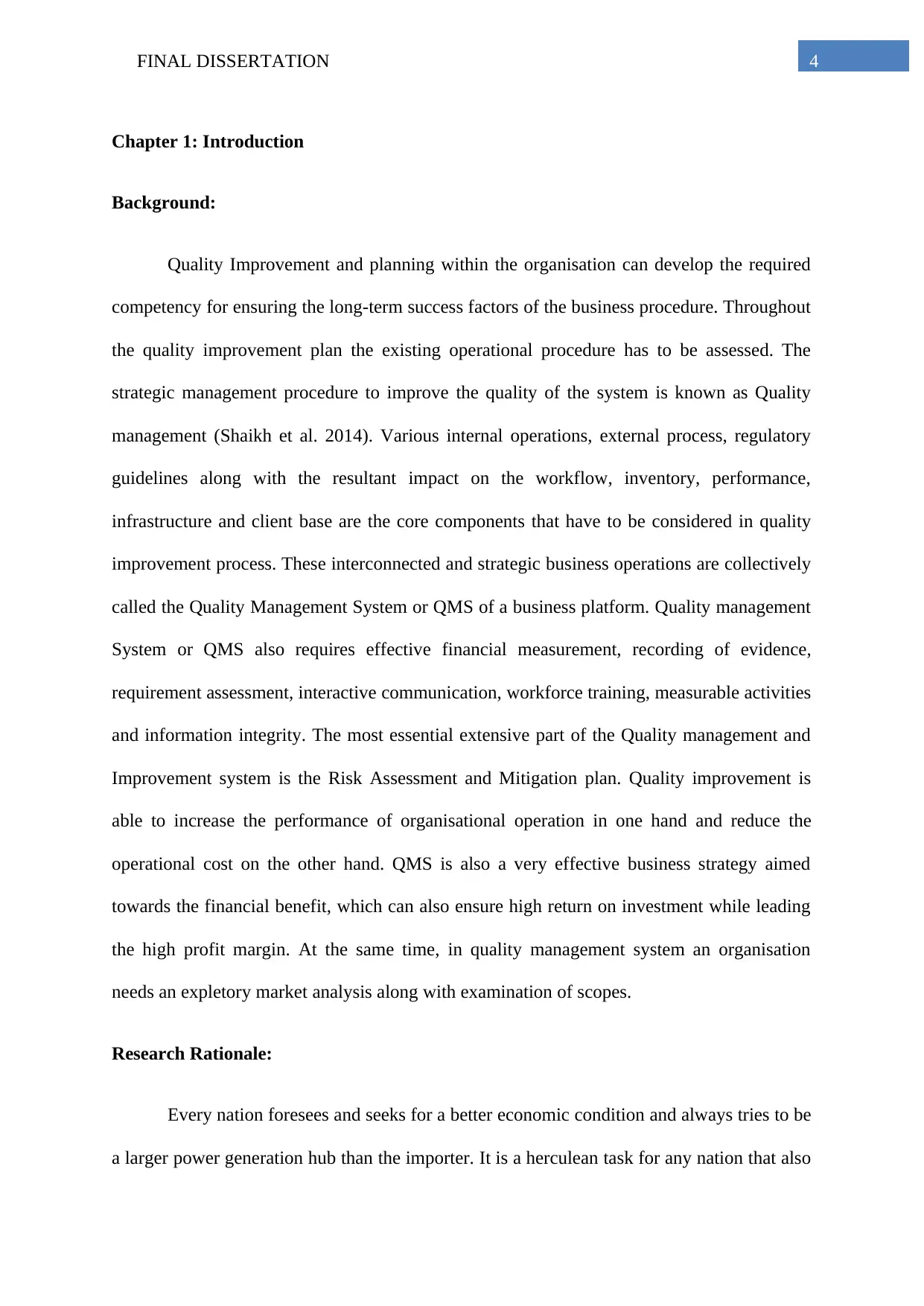
4FINAL DISSERTATION
Chapter 1: Introduction
Background:
Quality Improvement and planning within the organisation can develop the required
competency for ensuring the long-term success factors of the business procedure. Throughout
the quality improvement plan the existing operational procedure has to be assessed. The
strategic management procedure to improve the quality of the system is known as Quality
management (Shaikh et al. 2014). Various internal operations, external process, regulatory
guidelines along with the resultant impact on the workflow, inventory, performance,
infrastructure and client base are the core components that have to be considered in quality
improvement process. These interconnected and strategic business operations are collectively
called the Quality Management System or QMS of a business platform. Quality management
System or QMS also requires effective financial measurement, recording of evidence,
requirement assessment, interactive communication, workforce training, measurable activities
and information integrity. The most essential extensive part of the Quality management and
Improvement system is the Risk Assessment and Mitigation plan. Quality improvement is
able to increase the performance of organisational operation in one hand and reduce the
operational cost on the other hand. QMS is also a very effective business strategy aimed
towards the financial benefit, which can also ensure high return on investment while leading
the high profit margin. At the same time, in quality management system an organisation
needs an expletory market analysis along with examination of scopes.
Research Rationale:
Every nation foresees and seeks for a better economic condition and always tries to be
a larger power generation hub than the importer. It is a herculean task for any nation that also
Chapter 1: Introduction
Background:
Quality Improvement and planning within the organisation can develop the required
competency for ensuring the long-term success factors of the business procedure. Throughout
the quality improvement plan the existing operational procedure has to be assessed. The
strategic management procedure to improve the quality of the system is known as Quality
management (Shaikh et al. 2014). Various internal operations, external process, regulatory
guidelines along with the resultant impact on the workflow, inventory, performance,
infrastructure and client base are the core components that have to be considered in quality
improvement process. These interconnected and strategic business operations are collectively
called the Quality Management System or QMS of a business platform. Quality management
System or QMS also requires effective financial measurement, recording of evidence,
requirement assessment, interactive communication, workforce training, measurable activities
and information integrity. The most essential extensive part of the Quality management and
Improvement system is the Risk Assessment and Mitigation plan. Quality improvement is
able to increase the performance of organisational operation in one hand and reduce the
operational cost on the other hand. QMS is also a very effective business strategy aimed
towards the financial benefit, which can also ensure high return on investment while leading
the high profit margin. At the same time, in quality management system an organisation
needs an expletory market analysis along with examination of scopes.
Research Rationale:
Every nation foresees and seeks for a better economic condition and always tries to be
a larger power generation hub than the importer. It is a herculean task for any nation that also
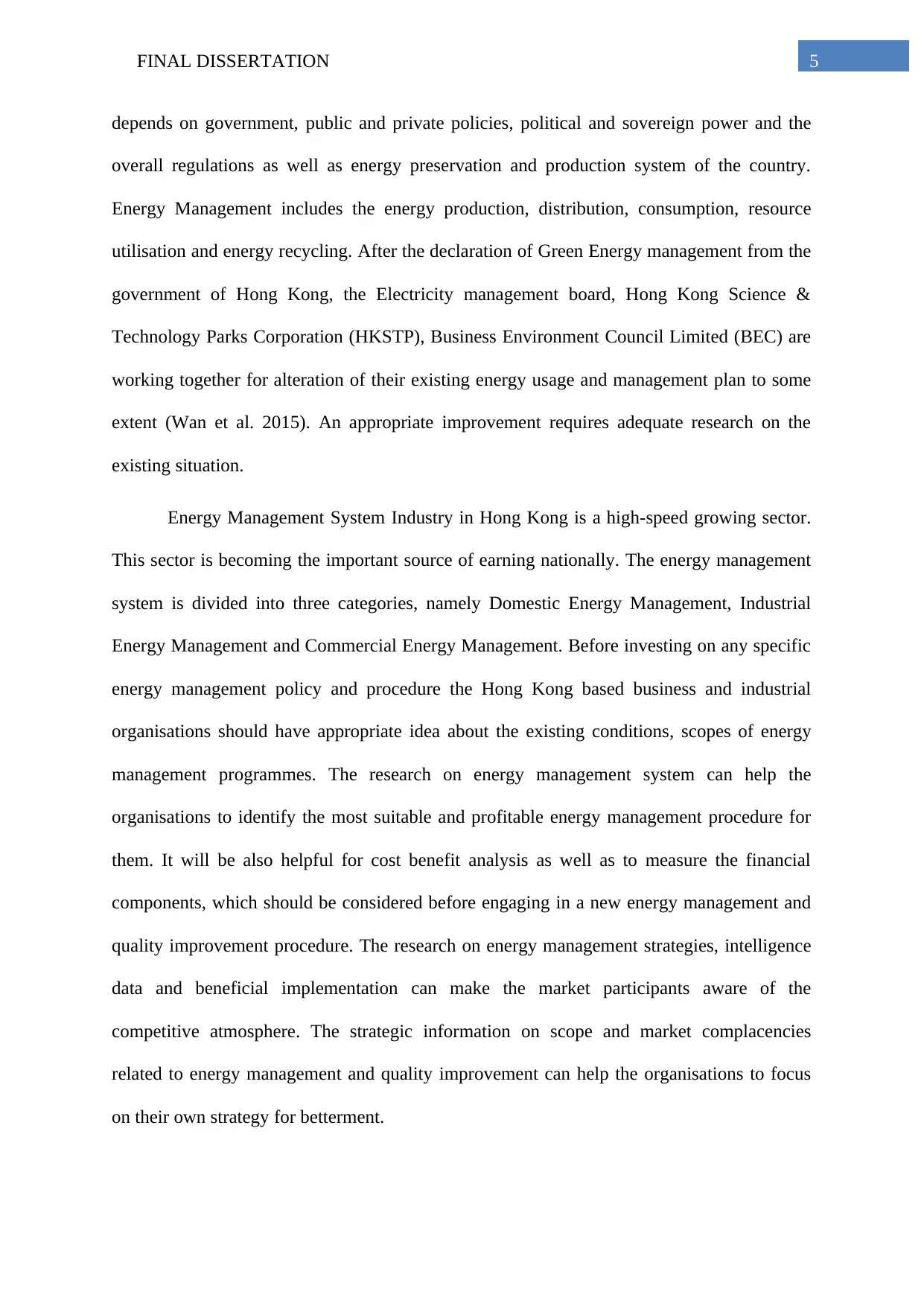
5FINAL DISSERTATION
depends on government, public and private policies, political and sovereign power and the
overall regulations as well as energy preservation and production system of the country.
Energy Management includes the energy production, distribution, consumption, resource
utilisation and energy recycling. After the declaration of Green Energy management from the
government of Hong Kong, the Electricity management board, Hong Kong Science &
Technology Parks Corporation (HKSTP), Business Environment Council Limited (BEC) are
working together for alteration of their existing energy usage and management plan to some
extent (Wan et al. 2015). An appropriate improvement requires adequate research on the
existing situation.
Energy Management System Industry in Hong Kong is a high-speed growing sector.
This sector is becoming the important source of earning nationally. The energy management
system is divided into three categories, namely Domestic Energy Management, Industrial
Energy Management and Commercial Energy Management. Before investing on any specific
energy management policy and procedure the Hong Kong based business and industrial
organisations should have appropriate idea about the existing conditions, scopes of energy
management programmes. The research on energy management system can help the
organisations to identify the most suitable and profitable energy management procedure for
them. It will be also helpful for cost benefit analysis as well as to measure the financial
components, which should be considered before engaging in a new energy management and
quality improvement procedure. The research on energy management strategies, intelligence
data and beneficial implementation can make the market participants aware of the
competitive atmosphere. The strategic information on scope and market complacencies
related to energy management and quality improvement can help the organisations to focus
on their own strategy for betterment.
depends on government, public and private policies, political and sovereign power and the
overall regulations as well as energy preservation and production system of the country.
Energy Management includes the energy production, distribution, consumption, resource
utilisation and energy recycling. After the declaration of Green Energy management from the
government of Hong Kong, the Electricity management board, Hong Kong Science &
Technology Parks Corporation (HKSTP), Business Environment Council Limited (BEC) are
working together for alteration of their existing energy usage and management plan to some
extent (Wan et al. 2015). An appropriate improvement requires adequate research on the
existing situation.
Energy Management System Industry in Hong Kong is a high-speed growing sector.
This sector is becoming the important source of earning nationally. The energy management
system is divided into three categories, namely Domestic Energy Management, Industrial
Energy Management and Commercial Energy Management. Before investing on any specific
energy management policy and procedure the Hong Kong based business and industrial
organisations should have appropriate idea about the existing conditions, scopes of energy
management programmes. The research on energy management system can help the
organisations to identify the most suitable and profitable energy management procedure for
them. It will be also helpful for cost benefit analysis as well as to measure the financial
components, which should be considered before engaging in a new energy management and
quality improvement procedure. The research on energy management strategies, intelligence
data and beneficial implementation can make the market participants aware of the
competitive atmosphere. The strategic information on scope and market complacencies
related to energy management and quality improvement can help the organisations to focus
on their own strategy for betterment.
⊘ This is a preview!⊘
Do you want full access?
Subscribe today to unlock all pages.

Trusted by 1+ million students worldwide
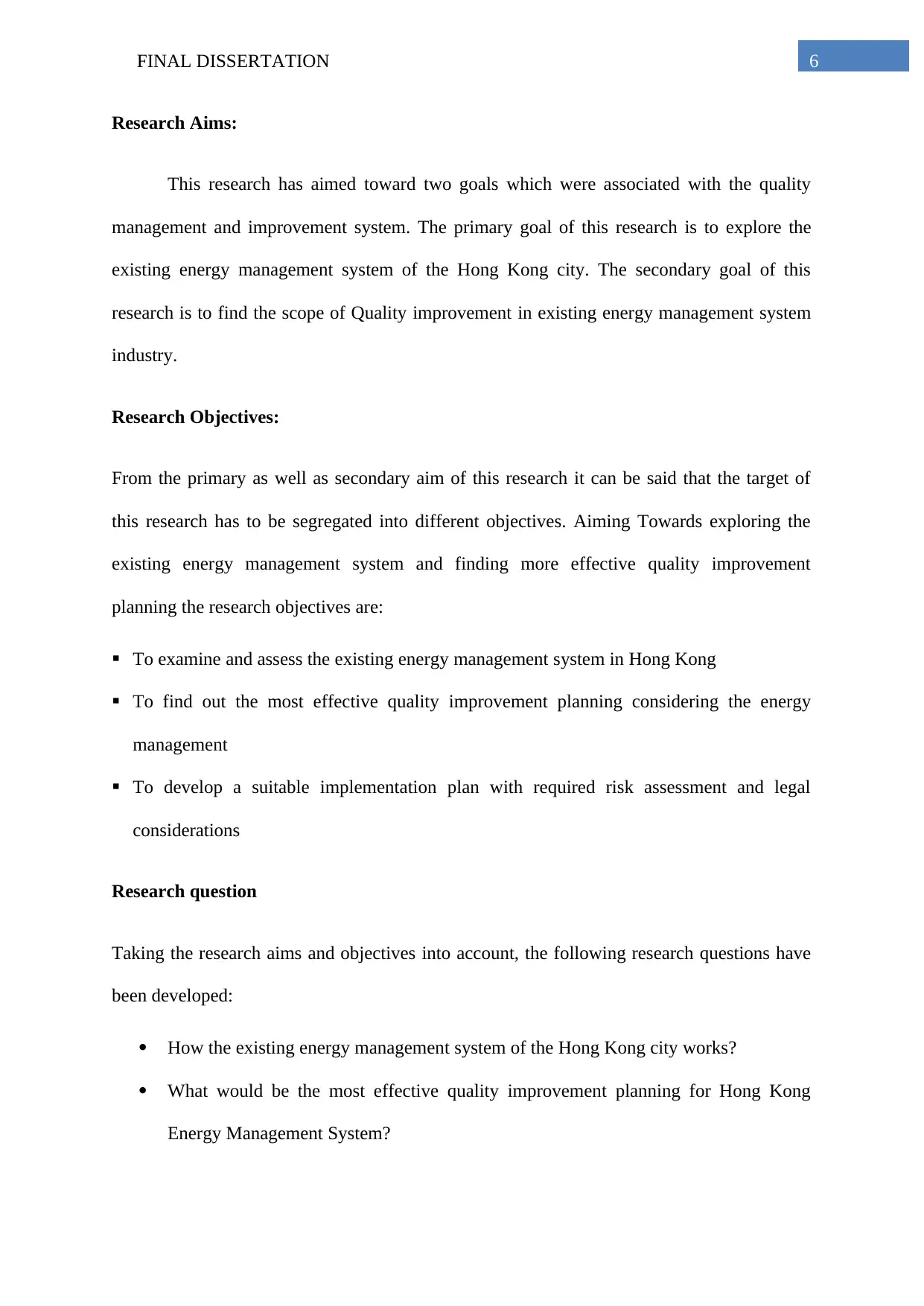
6FINAL DISSERTATION
Research Aims:
This research has aimed toward two goals which were associated with the quality
management and improvement system. The primary goal of this research is to explore the
existing energy management system of the Hong Kong city. The secondary goal of this
research is to find the scope of Quality improvement in existing energy management system
industry.
Research Objectives:
From the primary as well as secondary aim of this research it can be said that the target of
this research has to be segregated into different objectives. Aiming Towards exploring the
existing energy management system and finding more effective quality improvement
planning the research objectives are:
To examine and assess the existing energy management system in Hong Kong
To find out the most effective quality improvement planning considering the energy
management
To develop a suitable implementation plan with required risk assessment and legal
considerations
Research question
Taking the research aims and objectives into account, the following research questions have
been developed:
How the existing energy management system of the Hong Kong city works?
What would be the most effective quality improvement planning for Hong Kong
Energy Management System?
Research Aims:
This research has aimed toward two goals which were associated with the quality
management and improvement system. The primary goal of this research is to explore the
existing energy management system of the Hong Kong city. The secondary goal of this
research is to find the scope of Quality improvement in existing energy management system
industry.
Research Objectives:
From the primary as well as secondary aim of this research it can be said that the target of
this research has to be segregated into different objectives. Aiming Towards exploring the
existing energy management system and finding more effective quality improvement
planning the research objectives are:
To examine and assess the existing energy management system in Hong Kong
To find out the most effective quality improvement planning considering the energy
management
To develop a suitable implementation plan with required risk assessment and legal
considerations
Research question
Taking the research aims and objectives into account, the following research questions have
been developed:
How the existing energy management system of the Hong Kong city works?
What would be the most effective quality improvement planning for Hong Kong
Energy Management System?
Paraphrase This Document
Need a fresh take? Get an instant paraphrase of this document with our AI Paraphraser
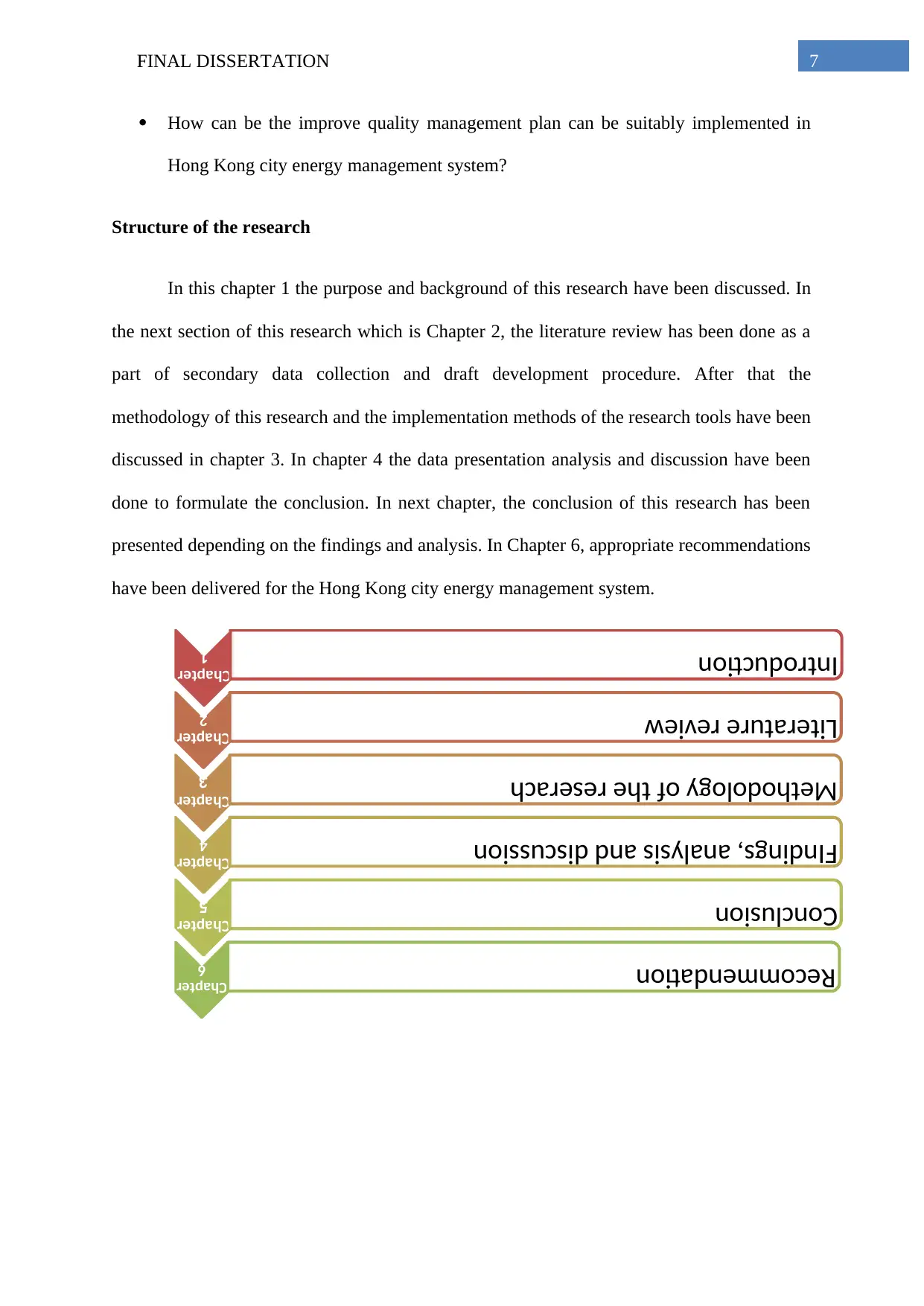
7FINAL DISSERTATION
How can be the improve quality management plan can be suitably implemented in
Hong Kong city energy management system?
Structure of the research
In this chapter 1 the purpose and background of this research have been discussed. In
the next section of this research which is Chapter 2, the literature review has been done as a
part of secondary data collection and draft development procedure. After that the
methodology of this research and the implementation methods of the research tools have been
discussed in chapter 3. In chapter 4 the data presentation analysis and discussion have been
done to formulate the conclusion. In next chapter, the conclusion of this research has been
presented depending on the findings and analysis. In Chapter 6, appropriate recommendations
have been delivered for the Hong Kong city energy management system.
Chapter
1Introduction
Chapter
2Literature review
Chapter
3Methodology of the reserach
Chapter
4FIndings, analysis and discussion
Chapter
5Conclusion
Chapter
6Recommendation
How can be the improve quality management plan can be suitably implemented in
Hong Kong city energy management system?
Structure of the research
In this chapter 1 the purpose and background of this research have been discussed. In
the next section of this research which is Chapter 2, the literature review has been done as a
part of secondary data collection and draft development procedure. After that the
methodology of this research and the implementation methods of the research tools have been
discussed in chapter 3. In chapter 4 the data presentation analysis and discussion have been
done to formulate the conclusion. In next chapter, the conclusion of this research has been
presented depending on the findings and analysis. In Chapter 6, appropriate recommendations
have been delivered for the Hong Kong city energy management system.
Chapter
1Introduction
Chapter
2Literature review
Chapter
3Methodology of the reserach
Chapter
4FIndings, analysis and discussion
Chapter
5Conclusion
Chapter
6Recommendation
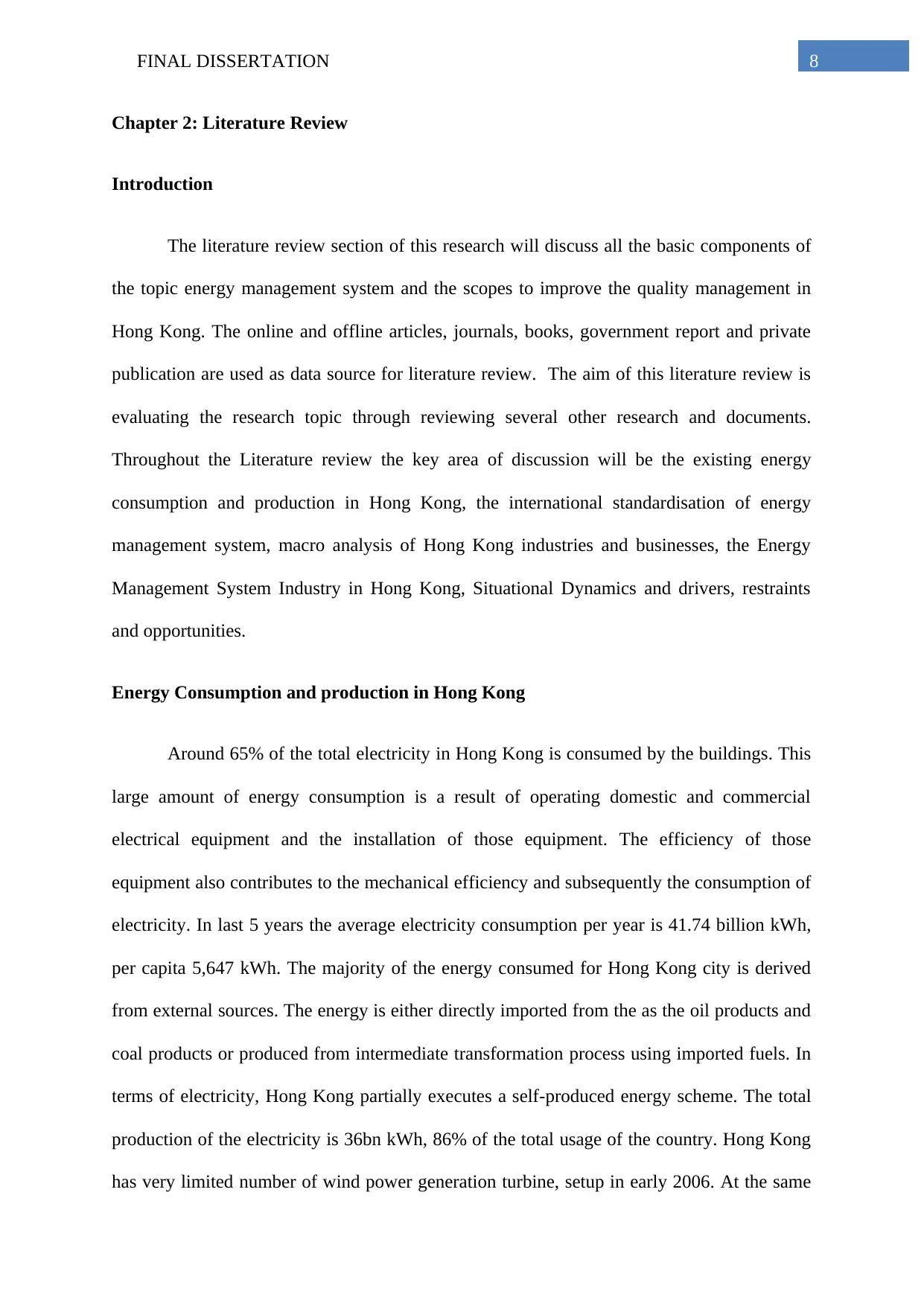
8FINAL DISSERTATION
Chapter 2: Literature Review
Introduction
The literature review section of this research will discuss all the basic components of
the topic energy management system and the scopes to improve the quality management in
Hong Kong. The online and offline articles, journals, books, government report and private
publication are used as data source for literature review. The aim of this literature review is
evaluating the research topic through reviewing several other research and documents.
Throughout the Literature review the key area of discussion will be the existing energy
consumption and production in Hong Kong, the international standardisation of energy
management system, macro analysis of Hong Kong industries and businesses, the Energy
Management System Industry in Hong Kong, Situational Dynamics and drivers, restraints
and opportunities.
Energy Consumption and production in Hong Kong
Around 65% of the total electricity in Hong Kong is consumed by the buildings. This
large amount of energy consumption is a result of operating domestic and commercial
electrical equipment and the installation of those equipment. The efficiency of those
equipment also contributes to the mechanical efficiency and subsequently the consumption of
electricity. In last 5 years the average electricity consumption per year is 41.74 billion kWh,
per capita 5,647 kWh. The majority of the energy consumed for Hong Kong city is derived
from external sources. The energy is either directly imported from the as the oil products and
coal products or produced from intermediate transformation process using imported fuels. In
terms of electricity, Hong Kong partially executes a self-produced energy scheme. The total
production of the electricity is 36bn kWh, 86% of the total usage of the country. Hong Kong
has very limited number of wind power generation turbine, setup in early 2006. At the same
Chapter 2: Literature Review
Introduction
The literature review section of this research will discuss all the basic components of
the topic energy management system and the scopes to improve the quality management in
Hong Kong. The online and offline articles, journals, books, government report and private
publication are used as data source for literature review. The aim of this literature review is
evaluating the research topic through reviewing several other research and documents.
Throughout the Literature review the key area of discussion will be the existing energy
consumption and production in Hong Kong, the international standardisation of energy
management system, macro analysis of Hong Kong industries and businesses, the Energy
Management System Industry in Hong Kong, Situational Dynamics and drivers, restraints
and opportunities.
Energy Consumption and production in Hong Kong
Around 65% of the total electricity in Hong Kong is consumed by the buildings. This
large amount of energy consumption is a result of operating domestic and commercial
electrical equipment and the installation of those equipment. The efficiency of those
equipment also contributes to the mechanical efficiency and subsequently the consumption of
electricity. In last 5 years the average electricity consumption per year is 41.74 billion kWh,
per capita 5,647 kWh. The majority of the energy consumed for Hong Kong city is derived
from external sources. The energy is either directly imported from the as the oil products and
coal products or produced from intermediate transformation process using imported fuels. In
terms of electricity, Hong Kong partially executes a self-produced energy scheme. The total
production of the electricity is 36bn kWh, 86% of the total usage of the country. Hong Kong
has very limited number of wind power generation turbine, setup in early 2006. At the same
⊘ This is a preview!⊘
Do you want full access?
Subscribe today to unlock all pages.

Trusted by 1+ million students worldwide
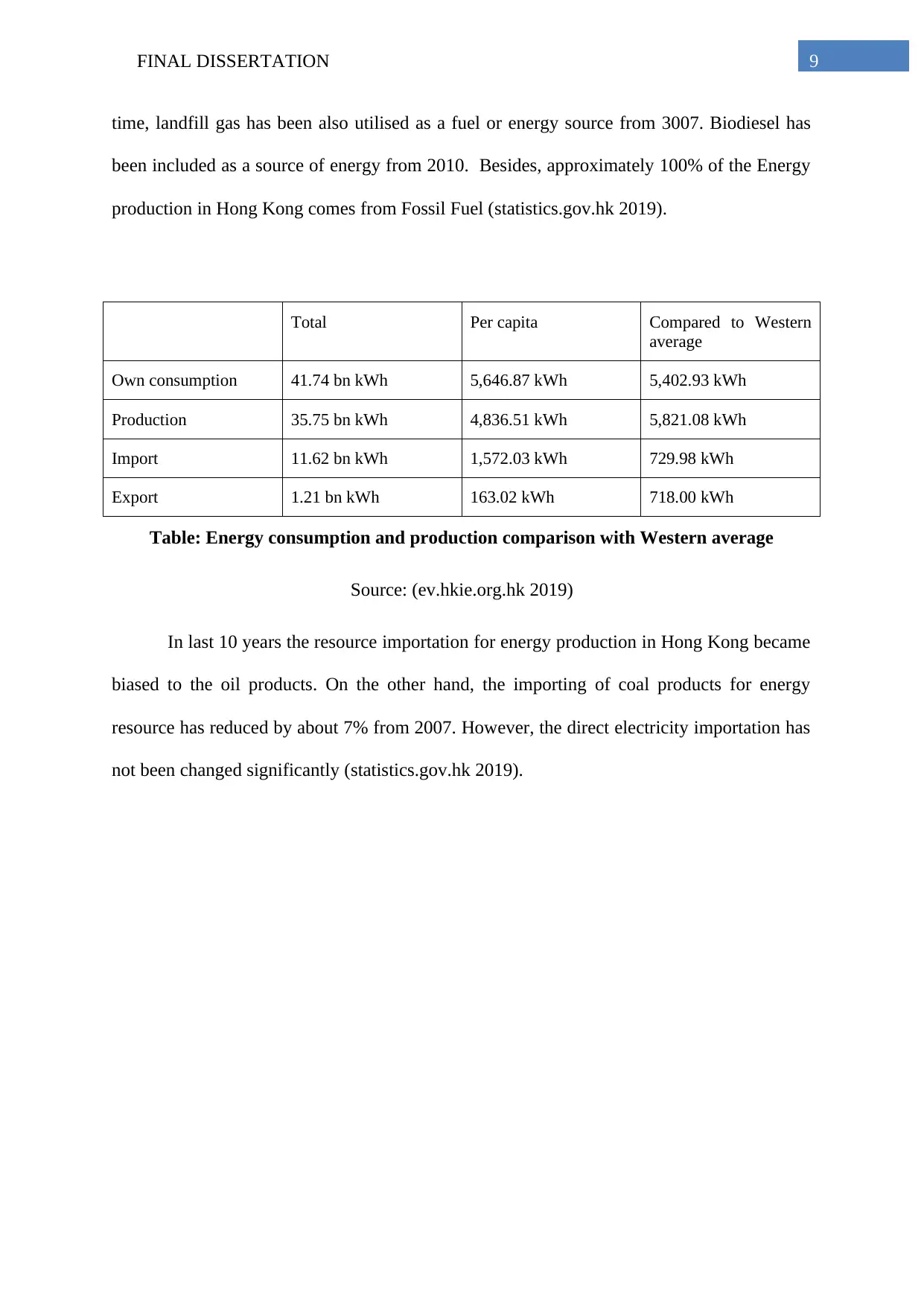
9FINAL DISSERTATION
time, landfill gas has been also utilised as a fuel or energy source from 3007. Biodiesel has
been included as a source of energy from 2010. Besides, approximately 100% of the Energy
production in Hong Kong comes from Fossil Fuel (statistics.gov.hk 2019).
Total Per capita Compared to Western
average
Own consumption 41.74 bn kWh 5,646.87 kWh 5,402.93 kWh
Production 35.75 bn kWh 4,836.51 kWh 5,821.08 kWh
Import 11.62 bn kWh 1,572.03 kWh 729.98 kWh
Export 1.21 bn kWh 163.02 kWh 718.00 kWh
Table: Energy consumption and production comparison with Western average
Source: (ev.hkie.org.hk 2019)
In last 10 years the resource importation for energy production in Hong Kong became
biased to the oil products. On the other hand, the importing of coal products for energy
resource has reduced by about 7% from 2007. However, the direct electricity importation has
not been changed significantly (statistics.gov.hk 2019).
time, landfill gas has been also utilised as a fuel or energy source from 3007. Biodiesel has
been included as a source of energy from 2010. Besides, approximately 100% of the Energy
production in Hong Kong comes from Fossil Fuel (statistics.gov.hk 2019).
Total Per capita Compared to Western
average
Own consumption 41.74 bn kWh 5,646.87 kWh 5,402.93 kWh
Production 35.75 bn kWh 4,836.51 kWh 5,821.08 kWh
Import 11.62 bn kWh 1,572.03 kWh 729.98 kWh
Export 1.21 bn kWh 163.02 kWh 718.00 kWh
Table: Energy consumption and production comparison with Western average
Source: (ev.hkie.org.hk 2019)
In last 10 years the resource importation for energy production in Hong Kong became
biased to the oil products. On the other hand, the importing of coal products for energy
resource has reduced by about 7% from 2007. However, the direct electricity importation has
not been changed significantly (statistics.gov.hk 2019).
Paraphrase This Document
Need a fresh take? Get an instant paraphrase of this document with our AI Paraphraser
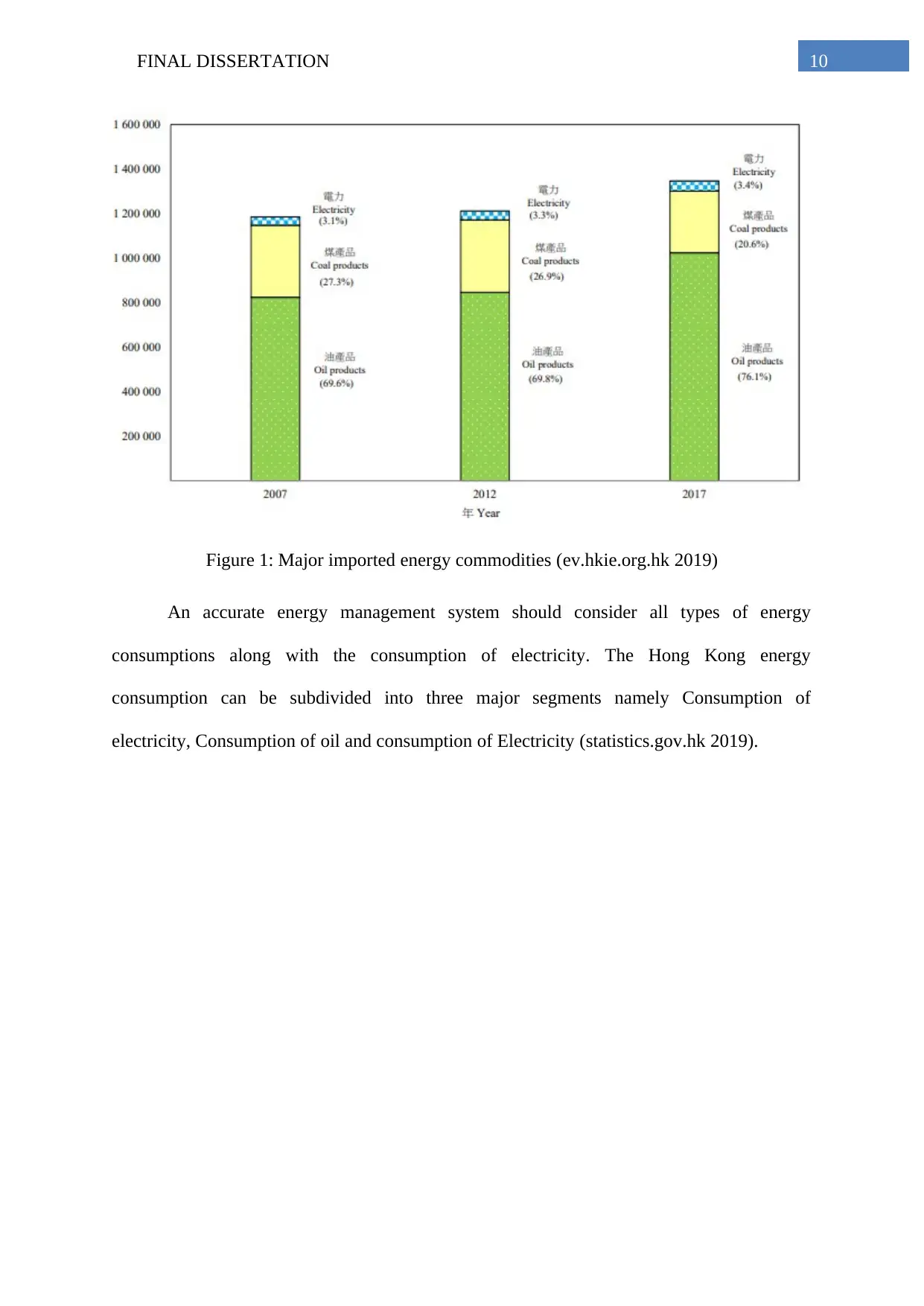
10FINAL DISSERTATION
Figure 1: Major imported energy commodities (ev.hkie.org.hk 2019)
An accurate energy management system should consider all types of energy
consumptions along with the consumption of electricity. The Hong Kong energy
consumption can be subdivided into three major segments namely Consumption of
electricity, Consumption of oil and consumption of Electricity (statistics.gov.hk 2019).
Figure 1: Major imported energy commodities (ev.hkie.org.hk 2019)
An accurate energy management system should consider all types of energy
consumptions along with the consumption of electricity. The Hong Kong energy
consumption can be subdivided into three major segments namely Consumption of
electricity, Consumption of oil and consumption of Electricity (statistics.gov.hk 2019).
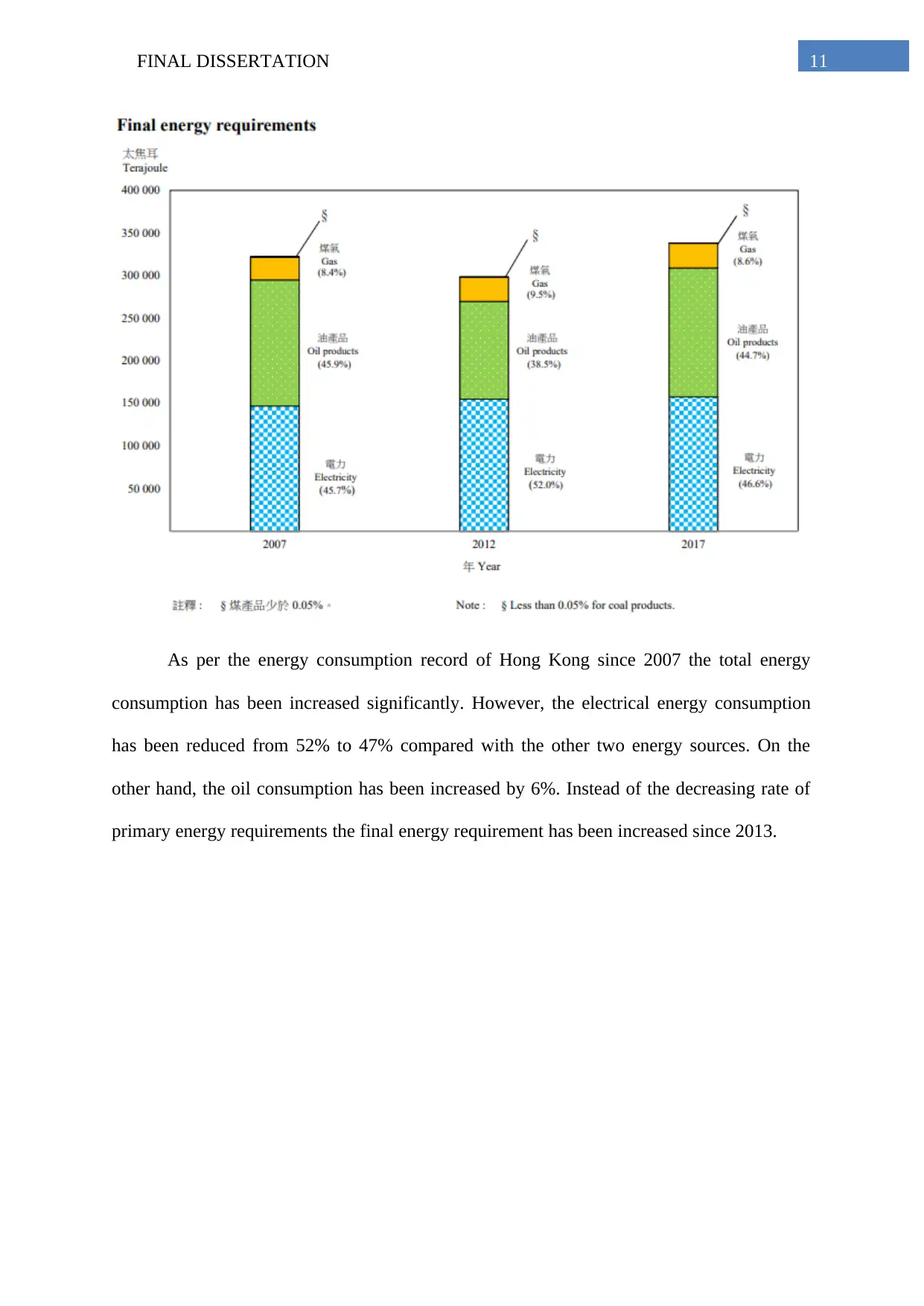
11FINAL DISSERTATION
As per the energy consumption record of Hong Kong since 2007 the total energy
consumption has been increased significantly. However, the electrical energy consumption
has been reduced from 52% to 47% compared with the other two energy sources. On the
other hand, the oil consumption has been increased by 6%. Instead of the decreasing rate of
primary energy requirements the final energy requirement has been increased since 2013.
As per the energy consumption record of Hong Kong since 2007 the total energy
consumption has been increased significantly. However, the electrical energy consumption
has been reduced from 52% to 47% compared with the other two energy sources. On the
other hand, the oil consumption has been increased by 6%. Instead of the decreasing rate of
primary energy requirements the final energy requirement has been increased since 2013.
⊘ This is a preview!⊘
Do you want full access?
Subscribe today to unlock all pages.

Trusted by 1+ million students worldwide
1 out of 65
Related Documents
Your All-in-One AI-Powered Toolkit for Academic Success.
+13062052269
info@desklib.com
Available 24*7 on WhatsApp / Email
![[object Object]](/_next/static/media/star-bottom.7253800d.svg)
Unlock your academic potential
Copyright © 2020–2026 A2Z Services. All Rights Reserved. Developed and managed by ZUCOL.





